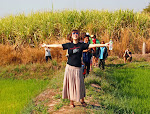
“Gold and money are fake, salt fish and rice are the truth” reads the front of the shirts celebrating the Human Rights festival recently put on by University students in Isaan. This sentiment I think adequately describes how I have viewed development both in the past and through my experience here in Thailand. Development driven by capitalist ideologies commonly violates human rights, negatively impacts the environment, and creates social injustices. Yet, if we, as human beings, re-think, re-construct, and re-process development through a sustainable and conscientious lens we may create be able to improve upon our current world. I’ve come to realize through my experience on this program that I can have a strong role in re-directing development and globalization; that indeed I can make a difference, and that I can be an active agent in my own life.Instead of wallowing in the woes of the world, I have come to realize my own active role in this developing world.
As an Anthropology major I have enjoyed observing culture as a way to make sense of my role in development here in Thailand. I am experiencing development through many lenses here in Thailand : as an American, a woman, a Caucasian, and a youth. It has been especially interesting to observe the contrast between Isaan culture and development and western influenced globalization. Isaan culture stresses a care for one’s natural resources, in part because the people rely on their land to survive as farmers. Thus, sustainability seems to be in line with the core ideologies surrounding Isaan life. Yet, it is blaringly obvious that the large scale development is penetrating the Northeast. I often wonder how globalization will end up affecting Isaan culture.
One of the communities we have visited, Nang Jahn, rests in a National Park, somewhat secluded, without electricity. A villager said, “If you cover your roots with concrete, you’ll never be able to find them again in response to development within Nahn Jahn. This quote I feel accurately depicts how I view development, especially in Thailand. Culture lies deeply within Isaan’s roots, and many of the developing or as some like to say “modernizing” projects appear to go in direct opposition to these cultural values. My time here has caused me to consider how I can preserve culture, both my own and that of Isaan. Instead of juxtaposing “tradition” with “modern” we must create a space where they can co-exist while benefiting one another.
By participating in this program I feel I have accomplished this in many ways, especially by living in villages with the people affected by the development projects we study. These homestays have afforded me with the opportunity to understand personal stories and histories in an effort to gain a deeper understanding of Isaan culture. By living my life here in Thailand as a person of Isaan I have expanded my view on development, especially internationally. Before coming to Thailand, I often thought of development in respect to my own life within the States, without fully comprehending interrelationship development plays throughout the world.
By respecting and treasuring Thai Isaan culture and bringing that knowledge and experience home with me to theU.S., I hope to influence the way others view development from a socio-cultural level. My role in development is not only about my view of the world, it incorporates everyone within this world. Thus, with this knowledge and experience I feel truly like a conscious global citizen. By actively raising my own awareness by continually seeking information, and by trying to raise awareness throughout my communities, I believe my role in development can be positive.
Eliza Leavitt - Kenyon College


